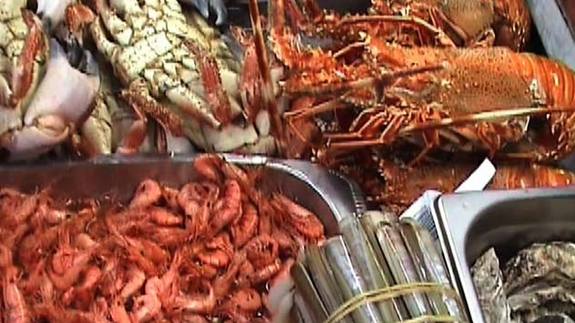
Tiny Chinese Island Sets Example for Sustainable Fishing (Op-Ed)

Nick Conger is former editor of the World Wildlife Fund (WWF) blog, On Balance. This article was adapted from his post An Island of Hope in China. Conger contributed this article to LiveScience's Expert Voices: Op-Ed & Insights.
Nestled in the Yellow Sea, just off the Northeast coast of China, lies a tiny patch of land called Zhangzi Island.
As I looked out the window of a ferry boat, the smog from Dalian receded in the background, and for the first time in three days, I saw blue sky. The island appeared in the distance, peppered with wind turbines and solar panels.
I was with a group of WWF-China staff, representatives from the Marine Stewardship Council (MSC) and China Sustainable Retail Roundtable, eager to see sustainable seafood production firsthand. Before docking, we watched as trawlers dropped nets more than 130 feet (40 meters) deep, skimming the sea floor, swiping up sea scallops. Two deep sea divers jumped in the freezing water and quickly returned with a small sample for our tasting pleasure.
Zhangzi Island thrives on the seafood industry — dominated by the Zhangzidao Group, which manages 70,000 hectares of the Yellow Sea. The company is a full-service operation, covering hatching, farming, processing and trading of shellfish. As the largest seafood company listed on Shenzhen Stock Exchange, it's so embedded into the island community that the 15,000 residents are shareholders: 30 percent of their collective income comes from seafood production.
Once we disembarked, the company took us to local processing facilities where workers split seafood shells with precision water technology, slicing the meat out cleanly, minimizing waste and using scant amounts of energy. Workers put the meat on ice, then boxed it for shipping to local markets where it will be eaten the following morning. The process is efficient, clean and mindful of the environment . If you look at its website, the company boasts a variety of certifications, from the popular "Green Food" certificate to a Chinese organic label.
But conspicuously absent is the MSC logo, one of the world's most credible and recognizable eco-labels. In fact, not a single fishery in China has been certified by MSC to date, but on WWF's recommendation, Zhangzidao Group is looking to change that. They have been pursuing MSC for about two years now, and currently the company is in the final assessment period, which could finalize as early as this year.
Sign up for the Live Science daily newsletter now
Get the world’s most fascinating discoveries delivered straight to your inbox.
"Zhangzi Island should be a great model for future fisheries in China," Kelvin Ng, MSC's Asia Regional Director told me as we watched the trawler bring up scallops from the sea. "As they are a community-owned fishery, the people of Zhangzi Island take great pride to ensure that their vessels are not overfishing — this, to benefit future generations. All vessels are monitored and recorded, providing useful information during the assessment of this iconic fishery."
The next day, Ng briefed members of the Sustainable Retail Roundtable on the value MSC certification can bring to their businesses. He stressed the traction MSC has gained in several markets with top retailers that provide sustainable seafood products, and he emphasized MSC's rigorous standards. Moreover, he told them how the certification helped retail companies meet strict criteria for reducing their impact on the environment.
As we boarded the ferry to head back to the mainland, I reflected on how major retailers can learn from this relatively small, island-based company in China. Zhangzidao Group is not required to pursue the MSC certification. The company is doing so voluntarily because they see the value of maintaining fish stocks into the future.
As China's economy grows, so does consumer demand for its products. Many fisheries in the Yellow Sea and other parts of Asia are vulnerable to overfishing as companies scramble to meet skyrocketing demand. An unsustainable approach would have ripple effects for communities like Zhangzi Island, and the habitats of species WWF is dedicated to protect.
"Scallops are of high conservation significance for this region," said Li Nan, WWF's head of Market Transformation in China. "Sustainable production can contribute to the conservation of the Yellow Sea, and to the wellbeing of local people and local business. Our collective efforts — NGOs, government, companies and certification bodies — can make a real difference."
Here's hoping Zhangzi Island serves as a model for the rest of China, and the world.
The views expressed are those of the author and do not necessarily reflect the views of the publisher. This adapted article was originally published on Live Science.









